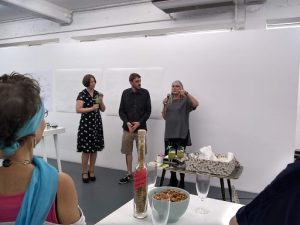In 2007, I was a frumpy housewife in small-town Ontario with two children running in all directions and two German degrees gathering dust in the attic. My career up to that point had consisted of a couple of poems one of my professors had seen fit to publish, an annual review of the German legal market which was lengthy but posed few stylistic challenges, and a decision to move to the margins of civilization to focus on having babies, canning beets, and feeding a woodstove.
“I know you’re dreadfully busy,” wrote an old friend on Facebook, which I used to check in between changing diapers, sealing mason jars, and flinging logs onto the fire, for in those days Facebook was still fun and I was still there, “But I have this family friend who is a translator and has too much work, do you think you could possibly help her out?”
The translator was Aileen Derieg and I was delighted to heed this particular call to adventure. She sent me the first job: an earnest meditation on building bridges, literally and figuratively, and what St. John Nepomuk could teach the EU. “Aileen Derieg has drunk champagne with you!” Facebook cheerfully notified me after I sent her my translation. That was about the best feedback I could have hoped for, so our collaboration continued.
And it turned out Aileen Derieg was about the best person one could ever hope to collaborate with. Not only had she established an enviable network of clients through years of highly competent work, but she was also thoughtful, patient, rational, open-minded, gracious, helpful, and – crucially in my case – understanding about the ups and downs of childcare and their impact on deadlines.
For years, she had been converting the densest, most intricate German prose into clear and readable English. Behind her back, those of us to whom she was subcontracting would sometimes trade frustrated messages. As one of her other assistants wrote to me in 2008: “I am despairing! My text is incomprehensible! Impossible! AAAARGHARGHARGHRGHAGHGAHRGHAGRHGAAAAGH. I have given up trying to understand the text, I am just painstakingly translating every sentence word by word…” But Aileen inhabited a lofty realm where such texts were the norm, and she translated them with aplomb.
One thing that became obvious when any of us asked Aileen for help disentangling webs of critical theory was that she had the utmost respect for all her clients and never adopted a mocking or dismissive attitude towards their work. Perhaps she was merely an early adopter of the maxim, “Dance like nobody’s watching, email like it’s going to be read out in a deposition someday,” but I believe she truly was filled with saintly goodwill. No matter how complex the style of a text or how surprising its content – she handled it with a sincere desire to understand it and communicate its message in English. This attitude, along with all the specific useful feedback she gave me over the years, taught me what I needed to know to go forward.
Aileen is retired now, and I will think of her with gratitude every day. Her very talented son, Christopher Hütmannsberger, and I will be available to serve her client base. And now that she’s not drowning in book projects, I might pepper her inbox with thorny translation questions every day. Watch out, Aileen!

Nicely written. Can we see the published poem?
You certainly can, since I can hand you the book next time we meet.